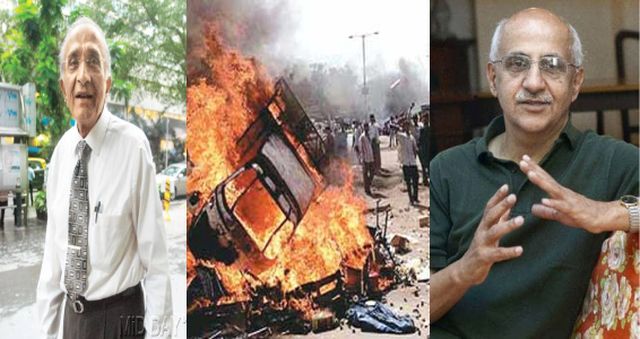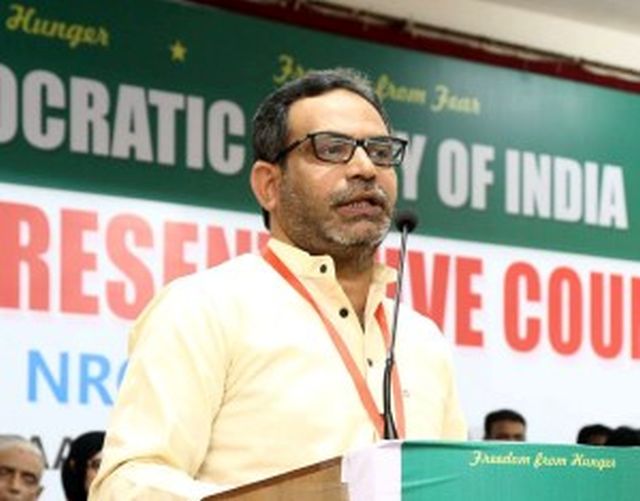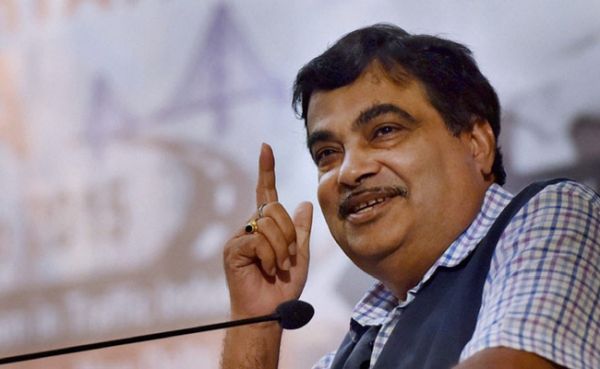
by admin | May 25, 2021 | News, Politics
 By Saket Suman,
By Saket Suman,
New Delhi : Special SIT court judge P.B. Desai “ignored evidence” that former Congress MP Ehsan Jafri, who was killed in a mob attack in Ahmedabad’s Gulberg Housing Society during the 2002 riots, did all that was possible within his power to protect Muslims from the “rage of the mob” and instead echoed the position of then Chief Minister Narendra Modi that his killing was only a “reaction” to his “action” of shooting at the mob, says human rights activist Harsh Mander.
He says that “the learned judge”, who retired in December 2017, overlooked statements by surviving witnesses that Jafri made repeated desperate calls to senior police officers and other persons in authority, “including allegedly Chief Minister Modi”, pleading that security forces be sent to “disperse the crowd” and rescue those “against whom the mob had laid a powerful siege”.
Mander, who quit the IAS in Gujarat in the wake of the riots, makes these observations in his just released book, “Partitions of the Heart: Unmaking the Idea of India”, published by Penguin.
The 66-year-old activist, who works with survivors of mass violence and hunger as well as homeless persons and street children, goes on to quote the late journalist Kuldip Nayar to establish that Jafri had desperately telephoned him, “begging him to contact someone in authority to send in the police or the Army to rescue them”.
Mander says Nayar rang up the Union Home Ministry to convey to it the seriousness of the situation. The Home Ministry said it was in touch with the state government and was “watching” the situation. Jafri called again, pleading with Nayar to do something as the mob was threatening to lynch him.
In the chapter titled “Whatever happened in Gulberg Society?”, Mander contends that Jafri did everything within his power to protect “those who believed that his influence would shield them from the rage of the mob”. Mander says Jafri begged the mob to “take his life instead” and in a show of valour went out “to plead and negotiate” with the angry crowd.
“When he realised that no one in authority would come in for their protection, he also did pick up his licensed firearm and shoot at the crowd…,” Mander notes, describing it as the “final vain bid” on behalf of Jafri to protect the Muslims in the line of fire.
The author notes that in describing Jafri’s final resort to firing as an illegitimate action, the judge only echoed the position taken repeatedly by Modi, who had given an interview to a newspaper in which he had said that it was Jafri who had first fired at the mob.
“He forgot to say what a citizen is expected to do when a menacing mob, which has already slaughtered many, approaches him and the police has deliberately not responded to his pleas,” says Mander.
He says that it was as if even when under attack and surrounded by an armed mob warning to slaughter them, “and with acid bombs and burning rags flung at them”, a good Muslim victim should do nothing except plead, and this would ensure their safety.
Ehsan Jafri’s wife Zakia Jafri, according to Mander, was firmly convinced that her husband was killed because of a conspiracy that went right to the top of the state administration, beginning with Modi. The author notes that the court, in its judgement running into more than 1,300 pages, disagreed.
“It did indict 11 people for the murder but they were just foot soldiers,” observed Mander.
He further says that the story the survivors told the judge over prolonged hearings was consistent but Judge Desai was convinced that there was “no conspiracy behind the slaughter” and that the administration did all it could to control it.
“Jafri, by the judge’s reckoning, and that of Modi, was responsible for his own slaughter,” he laments.
Mander also argues in the book that recurring episodes of communal violence in Ahmedabad had altered the city’s demography, dividing it into Hindu and Muslim areas and Gulberg was among the last remaining “Muslim” settlements in the “Hindu” section of the city.
He says that Desai also disregarded the evidence in the conversations secretly taped by Tehelka reporters, mentioning that superior courts, according to Desai himself, have ruled that while a person cannot be convicted exclusively based on the evidence collected in such “sting operations”, such evidence is certainly “admissible as corroborative proof”.
“But he chose to disregard this evidence, not because there was proof that these video recordings were in any way doctored or false but simply because the Special Investigative Team (SIT) appointed by the Supreme Court of India chose to ignore this evidence,” says Mander.
According to Mander, the Tehelka recordings “certainly supported the theory that there was indeed a plan to collect, incite and arm the mob to undertake the gruesome slaughter”.
The SIT was headed by R.K. Raghavan, today Ambassador to Cyprus. Mander contends in the book that just because the investigators did not pursue Tehelka recordings in greater depth, Desai concluded that the “recordings cannot be relied upon as trustworthy of substantial evidence and establish any conspiracy herein”.
In the book, Mander takes stock of whether India has upheld the values it had set out to achieve and offers painful, unsparing insight into the contours of violence. The book is now available both online and in bookstores.
(Saket Suman can be contacted at saket.s@ians.in)
—IANS

by admin | May 25, 2021 | News, Politics

SDPI national president M. K. Faizy
By Pervez Bari, Maeeshat.in,
Bhopal : The Social Democratic Party of India (SDPI) has termed the move to provide 10 per cent reservation for upper castes (the unreserved category) with reference to their economic backwardness a political gimmick and eyewash by BJP with an eye on forthcoming Lok Sabha elections.
SDPI national president M. K. Faizy in a statement said that it is the need of the hour to save community quota reservation system permanently so that it doesn’t get assaulted again and again by upper caste controlled political parties. The present move is a deliberate violation of constitutional provisions related to reservation in government services. He warned that the proposed constitutional amendment will be proved invalid.
The concept of reservation was initially meant for proportional representation in parliament and state assemblies which never happened. However, it was hijacked in a conniving manner and put into practice only in government job sector, that too not adequately, he said.
Faizy said that this step is a proof that BJP government does not have anything to showcase for the next election. They are trying all the options. He cautioned that the voters need to be vigilant about such gimmicks on the eve of a general election.
He said that real beneficiaries of such reservations are always rich people. To give real benefits, earning limit should have been kept much lower than Rs.8 lakhs as announced. With Rs.8 lakhs, majority of people will be included, thus, not really benefiting poor. This is a masterstroke from Prime Minister Narendra Modi.
Faizy pointed out that the Bill cannot be passed in Rajya Sabha as BJP has no majority in it. The planned legislation may not take a shape at all. He observed that by opening the Pandora’s Box the government is likely to lose its support from all backward communities, as the party will be seen as a forward community party, putting BJP in a more disadvantage position.

by admin | May 25, 2021 | News, Politics
 Hyderabad : The Telangana Rashtra Samithi (TRS) on Tuesday urged the Centre to amend the proposed Bill to provide 10 per cent reservation for economically backward people in the general category to include Telangana’s demand for quota for backward Muslims and Scheduled Tribes
Hyderabad : The Telangana Rashtra Samithi (TRS) on Tuesday urged the Centre to amend the proposed Bill to provide 10 per cent reservation for economically backward people in the general category to include Telangana’s demand for quota for backward Muslims and Scheduled Tribes
Telangana Chief Minister and TRS President K. Chandrashekhar Rao directed his party MPs to demand the amendments to the Bill when it is taken up in Parliament.
KCR, as Rao is popularly known, recalled that the Telangana Assembly had passed a resolution for providing 12 per cent reservation for backward Muslims and 10 per cent reservation for STs and had sent the same to the Union Government.
“This resolution should be introduced in Parliament,” said a statement from the Chief Minister’s Office.
As the central government has decided to take up the issue of reservations, KCR asked the MPs to raise the issue of providing reservation to the backward Muslims and STs and demand amendment to the Bill to this effect.
The Telangana Assembly had passed a Bill in 2017 enhancing reservations for backward Muslims and STs in the government jobs and educational institutions.
Currently the reservation for backward Muslims in the State is at 4 per cent and for STs it is at 6 per cent.
As the enhancement of quota will take the overall quantum of reservation in the state to over 50 per cent, KCR urged the Centre to include the State legislation into 9th Schedule of the Constitution as was done in the case of Tamil Nadu.
The Centre has not yet acted on the State’s request.
—IANS

by admin | May 25, 2021 | News

Bandra property of Dilip Kumar
Mumbai : Effectively debunking the claims of a Mumbai builder on Bollywood thespian Dilip Kumar’s prime plot in suburban Bandra here, the original owners of the property on Sunday reiterated that he is its “perpetual lessee” for a period of 999 years. Since the lease was signed in 1953, it expires in 2952.
The 96-year old Dilip Kumar and his 74-year old wife Saira Banu got a major boost in their ongoing property battle with Mumbai realtor Samir N. Bhojwani when the Seth Mulraj Khatau Trust (SMKT) issued Public Notices in the media on Saturday-Sunday through their lawyer Altamesh Shaikh.
The Public Notice categorically stated that Dilip Kumar is the “perpetual lessee” and not a tenant, as alleged, of the property “for the period of 999 years”. Besides, the rent on the property has already been commuted and the “lease is still valid and subsisting”.
The Public Notice has been issued on behalf of the legal heirs of the late Sunit C. Khatau, beneficiary of the SMKT settlement and the late Chandrakant M. Khatau, one of the Trustees, said a trustee, Panna S. Khatua, the widow of Sunit C. Khatau.
The latest development in the high-profile controversy came soon after the aged actor-couple, in their first pro-active offensive – hit out at builder Samir N. Bhojwani with a Rs 200 crore (Eds; Correct) defamation suit was first highlighted by IANS on January 4, 2019.
The Public Notice also alleged that Bhojwani and others have “created and manufactured” illegal back-dated documents of several properties of the SMKT, for which it has also lodged police complaints.
Bhojwani was arrested in connection with the police complaints and is currently out on conditional bail, and the bail cancellation matter is likely to come up before the Bombay High Court on January 7.
Referring to a Public Notice issued by Bhojwani around a fortnight ago, the SMKT said: “Samir Bhojwani claimed ownership of the property belonging to Dilip Kumar. Please note that Bhojwani is not the owner of the propertya The Property Card shows the name of Chandrakant M. Khatau as one of the owner and Dilip Kumar as ‘lessee’ by the sale deed dated 25 Sep. 1953.”
The Public Notice warned the members of the public against entering into any kind of deal with anybody for the property belonging to the SMKT as it would not be binding on the trust.
Earlier, the celebrity couple had even appealed to Prime Minister Narendra Modi and Maharashtra Chief Minister Devendra Fadnavis, but had launched a counter-attack on the realtor with the defamation notice after failing to get any response.
The dispute pertains to Dilip Kumar’s iconic Pali Hill bungalow No. 16 on a 1,600 sq. metres plot, said to be worth over Rs 250 crore. Since it is in a dilapidated state, he shifted in 2003 to his wife’s bungalow No. 34 in the same area in Bandra west.
Saira Banu has already announced that she will build a museum in honour of Dilip Kumar at the No 16 site, which is mired in a controversy since several years.
—IANS

by admin | May 25, 2021 | Opinions, Politics
 By Amulya Ganguli,
By Amulya Ganguli,
Unlike the Congress, the communists or the socialists, the Bharatiya Janata Party (BJP) has rarely seen major fissures.
Occasionally, a person may have become involved in political feuds within the party, as was Balraj Madhok, who was the president of the Jan Sangh, the BJP’s earlier avatar. But such ruptures were few and far between in the saffron camp whereas the Congress, the communists and the socialists had split more than once.
The reason why the Jan Sangh and the BJP escaped such break-ups was that the former was never a major party, having always been on the sidelines of national politics and, therefore, never seriously felt the pulls and pressures of ideological and organisational competitions with rival outfits.
As for the BJP, it is only now that it has emerged as a formidable force, mainly in northern and western India, and is still gingerly feeling its way elsewhere which includes suppressing some of its basic tenets relating to lifestyles.
The first major shock which the BJP experienced was when the Hindutva activists brought down the Babri Masjid in 1992, which is believed to have made Atal Bihari Vajpayee, one of the party’s tallest leaders at the time, contemplate resignation.
But the storm passed, making a party stalwart, Vijayraje Scindia, note with relief and satisfaction that the BJP did not split.
Since then, even as the party’s footprints have increased, those of its opponents have shrunk, viz. of the Congress and the communists, while the socialists have virtually disappeared.
The year 2014 marked the BJP’s rise to the top of the mountain. But, now, suddenly, after several electoral setbacks, there are signs that it may not be able to stay there for long.
Not surprisingly, there are hints of disquiet among the BJP’s allies, leading to patchwork repairs as in Bihar, where the party succeeded in smoothing the ruffled feathers of the Lok Janshakti Party.
But it could not prevent another ally, the Rashtriya Lok Samta Party, from leaving for the rival United Progressive Alliance.
Meanwhile, the ever-resentful Shiv Sena, which formally remains an ally, has continued to needle the BJP, this time over the Rafale deal by echoing the Congress’s line.
But these rumbles may have been dismissed as typical of responses when Big Brother appears vulnerable. But what is a great deal more significant than what the allies say or do are some of the observations of the Union Minister for Road Transport and Highways Nitin Gadkari, which look like a direct attack on the party bigwigs.
For instance, his view that elections cannot be won by someone merely because he speaks well cannot but be interpreted as criticism of none other than Prime Minister Narendra Modi himself, whose oratorical skills have become something of a lifeboat for the BJP for navigating troubled waters.
However, the fact that Modi’s rhetorical flourishes were not of much help to the party in Karnataka, Rajasthan, Madhya Pradesh and Chhattisgarh recently have not escaped the attention of political observers.
If Gadkari is saying that eloquence is not enough to cross the electoral Rubicon, it may be because he believes that others in the party are not playing their part.
For instance, he has said: “If I am the party president and my MPs and MLAs are not doing well, then who is responsible? I am.” The dig is too clearly aimed to need elucidation.
In addition, his opinion that the views of juniors have to be factored in and that “people must have collective spirit” is again a barb at the persons in organisational positions.
But even more than this not-too-veiled criticism, what was noteworthy was Gadkari’s reference to the country’s pluralist ethos, which runs counter to the BJP’s homogenising outlook based on a Hindu agenda.
By saying that India’s reputation as a tolerant country has attracted migrants to come and settle down, Gadkari has expressed a view which has little in common with Veer Savarkar’s concept of outsiders as “aliens” and M.S. Golwalkar’s preference for the status of second-class citizens for them.
But perhaps what is most suggestive of Gadkari’s distinctive line of thinking was his laudatory references to Jawaharlal Nehru, the man the BJP loves to hate at the moment.
Gadkari’s comments have naturally set off speculations about his motive. It has been said, for instance, by former BJP leader, Yashwant Sinha, that the Union minister is positioning himself as a person who can take Modi’s place in a coalitional arrangement in case the BJP does not get a majority of its own, as is generally believed.
By posing as a kinder, gentler person, Gadkari may be more acceptable to the old and new allies in a post-general election scenario.
He has two plus points. One is his proximity to the Rashtriya Swayamsevak Sangh (RSS), which will keep his critics in the BJP at bay, and the other is his reputation for efficiency, which has been amply demonstrated in the highway constructions and other infrastructural developments under his aegis.
For analysts, the expected ups and downs at personal levels in the coming weeks and months may well represent the mainstreaming of the BJP from being a rigid, sectarian outfit.
(Amulya Ganguli is a political analyst. The views expressed are personal. He can be reached at amulyaganguli@gmail.com)
—IANS





